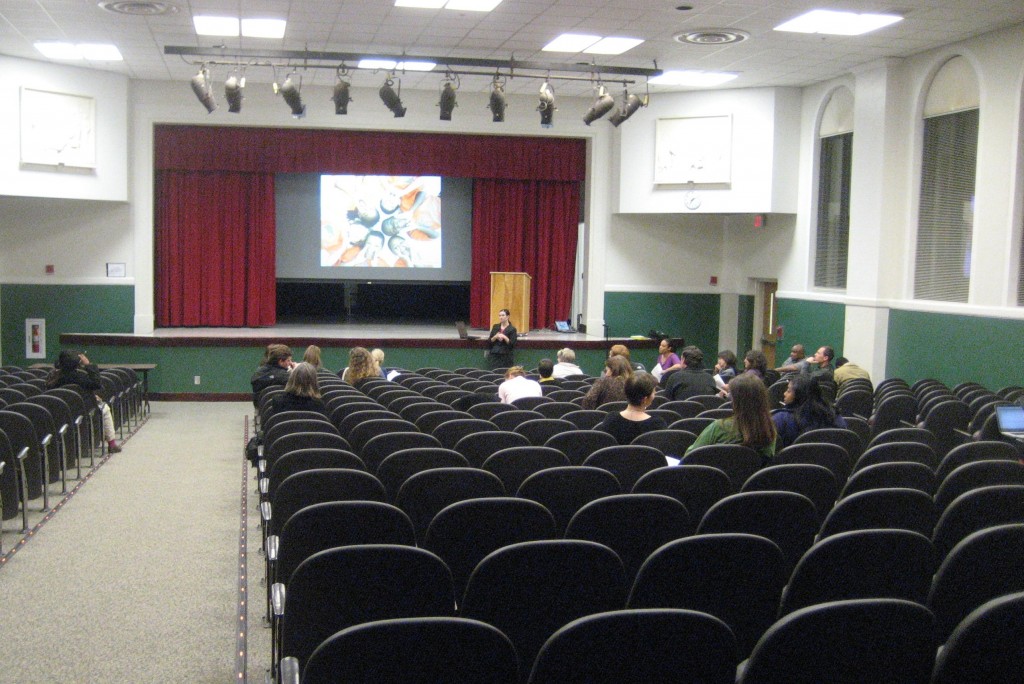
Two significant scheduling changes may be in the works for the 2013-2014 school year. Grady’s daily beginning and ending time may be shifted 15 minutes later, and APS may implement a new calendar for all schools that has more week-long breaks throughout the year.
At a safety and transportation meeting held on Jan. 9 at Grady, APS Director of Transportation John Lyles proposed a new bus schedule that would result in all APS high schools’ start and end times being shifted back to 8:30 a.m. and 3:30 p.m., respectively. Lyles said the reason for this change is the infamous Atlanta traffic that causes many school buses to be late.
“It’s horrendous. One of the worst commutes in the country,” Lyles said at the meeting. “So just imagine if you had to drive a 72-passenger bus with 72 students in that traffic on a daily basis. It is extremely, extremely difficult.”
Lyles said right now, buses have to transport 40,000 students per day, which means 7 million student trips per year, and bus drivers only have 15 minutes between dropping off elementary school students and high school students. Lyles also said if things remain as they are, APS would have to buy 50 new buses for high schools at about $100,000 each.
Last August, APS had to buy 49 new buses and add 850 bus stops after parents complained about the lack of bus transportation. The district had cut 1,400 bus stops at the beginning of the year to save money, prompting the outcry.
The new bus schedule will be proposed to Atlanta Board of Education on Feb. 4.
Another schedule change that may be implemented next school year is a new APS-wide calendar that would result in fewer day-long breaks from school, and more week-long breaks.
At a district calendar meeting for community feedback held on Jan. 28 at Inman Middle School, Rebecca Kaye, the director of policy for APS, explained that the district would like to move all elementary, middle and high schools to one single calendar for the 2013-14 and 2014-15 school years. Currently, three APS elementary schools adhere to a year-round schedule, in which the school year starts July 10 and ends May 31. The other 82 schools, including Grady, operate on the traditional calendar.
Kaye said one reason for consolidating the APS calendar was high student mobility between schools that operate on different calendars. This resulted in students finding themselves behind at their new schools.
According to the superintendent’s report at an APS board meeting on Jan. 14, “the calendar development process for 2013-14 and 2014-15 included a community-wide survey with approximately 5,900 respondents as well as analysis of student attendance data.”
The results of the survey indicated overwhelming support for implementing a balanced or traditional calendar, rather than a year-round calendar. According to the results, 87.6 percent of community members listed the balanced or traditional calendar as their first choice, while only 12.4 percent listed a year-round calendar as their first choice.
Kaye said the survey also indicated community members want the school year to start as late as possible.
“I’m sure that if I had put dates later than [Aug. 12, the latest start date on the survey], then people would have chose that,” Kaye said. Despite support for a later start date, the start date for the 2013-14 school year under the current proposed calendar is Aug. 5.
Several parents at the meeting said the APS calendar starts too early, and others pointed out that very few other school systems start their school year as early as APS schools do.
“For some reason Georgia decided that this is the way to go,” said one parent. “It seems cuckoo to me.”
“It feels very early, coming back that first week in August,” Cecily Harsch-Kinnane, school board member and Grady parent, said. “So if I had to choose, you know, I’d go later in the summer and have less breaks.”
The biggest difference between the proposed calendar and the calendar to which Grady currently adheres is that there are fewer one-day breaks from school, and more week-long breaks from school. In the proposed new calendar, there would be four week-long breaks throughout the school year (fall break, Thanksgiving break, winter break and spring break) in addition to a two-week semester break and a nine-week summer break.
Kaye said these longer breaks are intended to improve student and teacher morale.
“There [will be] a break on the horizon when students are starting to get stressed out,” Kaye said.
Some parents, however, said they would prefer a longer summer to frequent breaks throughout the school year, because it is easier to schedule activities for their children in the summer than during the week-long breaks.
Other parents said the frequent breaks throughout the school year would pose a problem for parents who couldn’t afford childcare.
“Most people in America get two weeks of vacation,” a parent said at the meeting at Inman. “What do [the parents who can’t afford childcare] do?”
Another point of concern for many parents at the meeting was the ambiguity of the survey. Some parents said they didn’t know what some of the things on the survey meant.
“This process is horribly flawed,” one parent said.
Harsch-Kinnane said, however, that though the survey had limited numbers of ways it provided for community members to answer, it may still have been executed as well as it possibly could have.
“I think surveys are hard to ever get perfect,” Harsch-Kinnane said. Furthermore, Harsch-Kinnane said the rate of participation in the survey was encouraging.
“To get a 10 percent, you know, rate of participation is actually pretty strong,” Harsch-Kinnane said.
Ultimately, Harsch-Kinnane said, the proposed calendar doesn’t differ significantly from Grady’s current calendar.
“I don’t think [the proposed calendar] horrible, by any means,” Harsch-Kinnane said.
The new calendar will be proposed to the APS board members on Feb. 4, with another public comment period from Feb. 5 to March 1. The final vote on the calendar by the APS board of education will be on March 4.
The new calendar will be proposed to the APS board members on Feb. 4, with another public comment period from Feb. 5 to March 1. The final vote on the calendar by the APS board of education will be on March 4.







